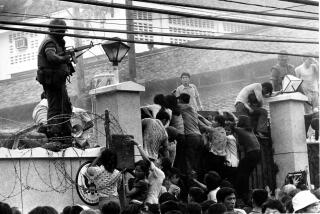Working as If There Is No Tomorrow
- Share via
In 1961, a young Khamchong Luangpraseut was forced to make a momentous decision.
Laos was in a bloody civil war, and as the 20-year-old man watched his parents drive away from their home, he heard the unmistakable bark of gunshots.
“I went running after them, hoping to tell them, ‘Don’t go,’ ” he said.
It was too late. Both parents were ambushed and shot to death. Seeing his parents lying on the ground, he was staggered.
“My first feeling was I wanted to kill myself. But then, a strange thing happened. Everything started to become dark. And I realized I cannot die. I need to be here to help people. I decided to be a good carrier of the name of my father and my mother,” he said.
That “point of no return in my life,” as he calls it, remains the force that drives him. He takes no vacations, works seven days a week and sleeps “maybe four or five hours a night” because “that’s all I need,” he said.
“Ever since seeing my parents killed, I have seen life as so temporary. It’s as if I have only five minutes to live,” said Khamchong, the name he uses. “I see life as having no tomorrow, and if tomorrow comes, I will continue to do my very best.”
Today, those energies are directed toward the Santa Ana Unified School District, where he is supervisor of Indochinese programs. Khamchong, 50, has immersed himself in the job for 11 years.
But, he said, “one Khamchong never left Laos. He is a Laotian in his heart who must do something for his country. Khamchong has vowed to return to his native country in 1995 “and build a special bridge between America and Laos.”
The “other Khamchong,” he said, is a “guest of the United States who means to contribute something to this country. It is my way of saying, ‘Thank you very much, America.’ ”
Khamchong said he is “dedicated to the children and parents” of the 46,000-student Santa Ana schools.
“I am very inspired by American education,” he said. “It is a system accessible to all, no matter how old you are. Here, anyone over 18 can go to college, and a man of 35 can get a high school diploma. That is unheard of in most of the world. Here a school’s curriculum is developed locally, by a board elected locally. That power of a local community to develop its own curriculum and provide direction is tremendous.”
Khamchong, who speaks seven languages, said his role is to teach American and Indochinese students about each other.
“The future of America is to be very diversified,” he said. “But that diversity enriches this wonderful country. It is like being able to eat in not only one restaurant, but also a French restaurant, a Chinese restaurant or a Japanese one. We now have a gourmet cuisine.”
For Asians and Indochinese immigrants, there is much more to learn than just the language, Khamchong said.
“The concept of individual worth is very new to Asians. Americans respect individual liberties, power and materialistic worth. In Asia you comply with the group. Here, the majority protects the rights of all the people. You might have nine votes yes and one vote no, but that one no vote is not suppressed. That is very new to us.”
As the United States taps into the Asian influences and allows them to contribute, the country will be enriched, he said.
“Once we are rooted here and our talents are allowed to come along, we can become great ambassadors for this country.”
More to Read
Sign up for Essential California
The most important California stories and recommendations in your inbox every morning.
You may occasionally receive promotional content from the Los Angeles Times.













